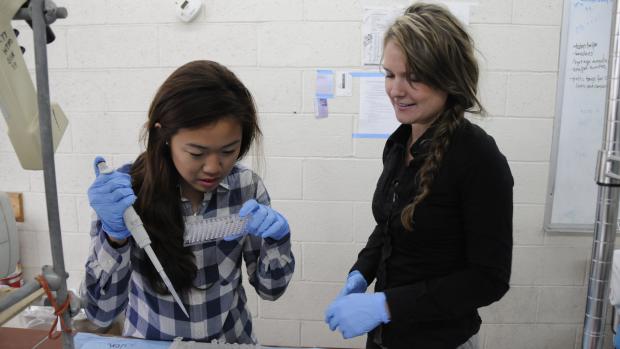Building a Legacy in the Lab
Students Team Up for Army Research Office Undergraduate School Apprenticeship Program (ARO-URAP)

Jasmin Hume, a fourth year PhD student in Materials Science, and Jennifer Sun, a senior in the Biomolecular Science Program, two students in the Montclare Lab, were recently recipients of the Army Research Office Undergraduate School Apprenticeship Program (ARO-URAP) and the Graduate Mentoring Fellowship. They have been working together since May 2012. Currently, their research focuses on designing proteins that will eventually self-assemble to create protein fibers. By attaching smaller molecules to the proteins, they can be used for targeted drug delivery.
As part of the ARO-URAP and Graduate Mentoring Fellowship, Hume and Sun wrote quarterly reports detailing their research efforts together. Hume also attended seminars on undergraduate mentoring and joint research. During these seminars she designated goals for the team and their research project while speaking with other mentors about the challenges of mentoring undergraduate researchers.
Working with each other almost every day seems to suit Jasmin and Jennifer. As Jennifer’s mentor, Jasmin was able to break her project into smaller pieces and assign Jennifer the subtopics. Jennifer, an independent worker, has flourished in the lab, mastering techniques such as confocal microscopy and data analysis. In addition to gaining technical laboratory skills, Jennifer is proud to say that she has been able to transfer the skills she’s developed in the lab to her academics and in the classroom setting. She’s thinking like a scientist in all aspects of her life.
As a mentor, Jasmin believes she has gained invaluable experience, “For me, having mentors whether in the lab or classroom, it’s just getting you to understand that you can do something.” She emphasized that anyone who works in a lab has a mentor. No matter what, nobody is born knowing how to do research, confocal microscopy, or data analysis. She also stressed the idea that mentors are responsible for their mentees’ futures; the unfortunate result of having a bad mentor is that students are turned off to the STEM fields -- an area continually clamoring for more students. Jasmin and Jennifer both agreed that a sense of accomplishment is beneficial for mentees who should be guided and challenged. Jennifer emphasized how her work has molded her, “My research experience has contributed to who I am now. I feel more accomplished being in this lab than anything else I’ve done at NYU-Poly.” But this dynamic team doesn’t simply conduct research; they are also involved outside the lab.
Jennifer and Jasmin are also continuing the NYU-Poly tradition of entrepreneurship by filing a provisional patent based on five years of research on their project (two of which Jasmin and Jennifer directly contributed). The research may have resulted in a patent, but they did not stop there. Jasmin launched her own startup called BenchPals, which designed an app to help researchers monitor and digitize laboratory and data management, while Jennifer is currently minoring in Business Studies at NYU as well as Business and Technology Management at NYU-Poly.
Perhaps the influence of Professor Jin Montclare has resulted in such an entrepreneurially-minded research experience for Jasmin and Jennifer. Montclare (whose startup created an iPad app called Lewis Dots, which visualizes Lewis Dot diagrams) “understands that there is an importance in promoting science and getting it out there,” says Hume. “Jin […] understands how and why this is necessary.”
All in all, Jin Montclare’s lab is focused on the future: the future of science, the future business implications of their work, and the future scientists and researchers, like Jasmin and Jennifer, who will continue her legacy.




